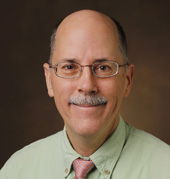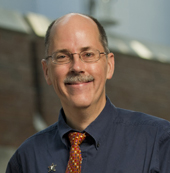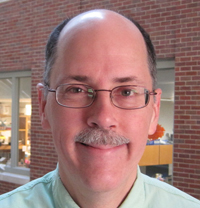Charles Sanders, Ph.D., has been named associate dean for Research in the Basic Sciences of Vanderbilt University School of Medicine.

In his new role, Sanders, professor of Biochemistry and Medicine and director of Graduate Studies in the Department of Biochemistry, will promote research within the Basic Science departments and at their interfaces with Vanderbilt University Medical Center and Vanderbilt University.
He plans to remain active in research and in both graduate and medical school teaching while he works to identify and address research opportunities and needs, promote and coordinate responses to emerging funding opportunities, oversee core facilities, promote technology transfer and interface with the University’s Center for Technology Transfer and Commercialization.
“My activities will, of course, be coordinated with those of the other associate deans of the school in the areas of faculty affairs, promotion of diversity and education,” he said.
For 25 years Sanders, Aileen M. Lange and Annie Mary Lyle Professor of Cardiovascular Research, has run his lab devoted to determining the biochemical, biophysical and structural mechanisms by which defective/dysfunctional membrane proteins contribute to various human diseases, including Alzheimer’s disease, heart disease, Charcot-Marie-Tooth disease and kidney fibrosis, while training students and postdocs.
“In addition to making sure junior faculty are well-supported and protected from being prematurely overburdened with administrative and service responsibilities, I think a particular challenge in this day and age is making sure they are able to maintain hope and optimism that if they pour themselves into establishing their labs and are able to transduce their effort into timely, high quality publications, that everything else (funding, advancement and recognition) will almost always follow,” he said.
“While there is good reason to be concerned about trends in the level of support for academic and medical research in the U.S., it is a happy fact that many of our young School of Medicine faculty continue to thrive. Promoting a climate for young faculty at Vanderbilt where they are effectively mentored and encouraged both by more senior faculty and — perhaps just as importantly — by each other, must be a priority of the Office of the Dean,” Sanders said.
Sanders earned his Ph.D. in chemistry from The Ohio State University and did postdoctoral studies at Yale University. He joined Vanderbilt’s faculty in 2002.
He served two terms on National Institutes of Health study sections and recently completed 13 years of service as associate editor and interim editor-in-chief of the American Chemical Society journal Biochemistry. He is a longtime member of the executive committee of the Center for Structural Biology and serves on the Council of the Protein Society.
“Chuck is a terrific scientist who has done great research on a broad range of membrane proteins,” said Lawrence Marnett, Ph.D., Dean of Basic Sciences and Mary Geddes Stahlman Professor of Cancer Research. “His work has defined the role of particular structural motifs in protein function and their dysfunction in disease. He has won multiple national awards for his contributions.
“He is greatly respected throughout the School of Medicine and the University and will play a key role in advancing the research enterprise at Vanderbilt as associate dean for Research,” Marnett said.














